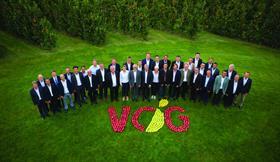
Every year, around this time, some of the best-quality apples from South Tyrol are sold to customers in the UK. Supplying varieties including Royal Gala, Braeburn, Pink Lady and Jazz, Italy’s north-eastern province might not send the volume that, for example, France does, but it is nonetheless a key player in the British retail and wholesale trades when it comes to premium top fruit.
Yet Italian apples haven’t always been available here. Nor indeed have they been visible for all that long in markets like Spain, Libya and other countries around the Mediterranean, where they now sell in significant amounts. Even less than 20 years ago, South Tyrol sent more than 90 per cent of its apples to customers in Italy and Germany; nowadays that figure has fallen below the 60 per cent mark. As its largest consortium of producers, Vog, celebrated its 70th anniversary in late August, the enormity of the progress made by the South Tyrolean apple industry in terms of consolidating and staying competitive was clear. With new opportunities emerging in Europe, North Africa, the Middle East and Asia, perhaps the most impressive thing about this closeness and co-operation is the fact that they were forged in the aftermath of the most divided and destructive period of Europe’s history.
In 1919, the victorious post-war Allies made good on a pact signed in London allowing Italy to seize control of South Tyrol, which was previously part of Austria. For the next three decades, its German-speaking apple producers were content to trade more or less exclusively with customers in Germany and Austria to the north, as well as with their Italian neighbours to the south. But when the Second World War ended, the stark reality of their over-reliance on Germany was laid bare. The Brenner Pass, South Tyrol’s route to the north, was closed off and the region was banned from selling its apples to Germany. Its various producer co-operatives needed to find new markets fast.
Georg Viehweider, a journalist and former editor of the agricultural trade paper Südtiroler Landwirt, picks up the story: “The view soon prevailed that this difficult task could not be fulfilled by a single co-operative. Josef Ungericht, chairman of the fruit co-operative Cafa, managed to convince others to work together more closely.”
So, out of necessity, Vog was created as an alliance of, initially, nine co-operatives on 24 August 1945. “There is no doubt the main reason for merging was the quest for new export markets,” Viehweider notes. “Right after the war even exchanging letters or making a telephone call to anyone in Germany, which had been the main sales area, was not allowed. So it was no surprise that other co-operatives soon joined.
“The main target markets were northern European countries, the UK and Switzerland, but also the Middle East and Africa. Slowly but surely, the all-important sales channels to Germany re-opened, albeit apples could only be sold to the occupying forces.
“It soon became clear that there was only one way to fight overproduction and fierce competition: quality.”



